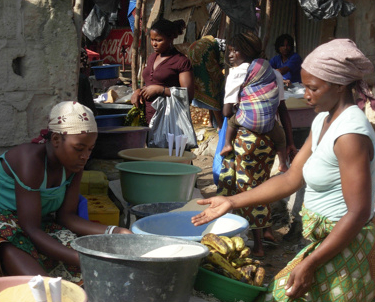
A woman in Maputo buys a bag of sand—a popular snack – from a street vendor. It’s a dangerous health risk, as Muchanga explained in an award-winning piece. (Photo by Mercedes Sayagues)
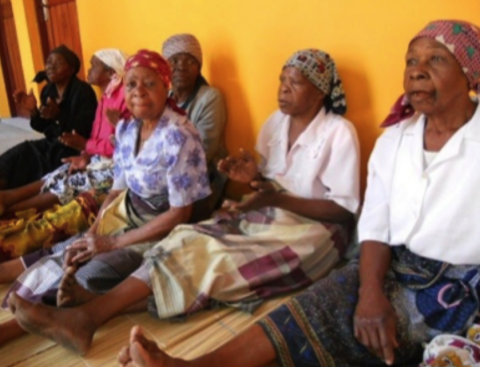
Muchanga was the first to focus on elderly women whose families accuse them of witchcraft—often as a way to avoid the cost of elder care. (Photo by Mercedes Sayagues)
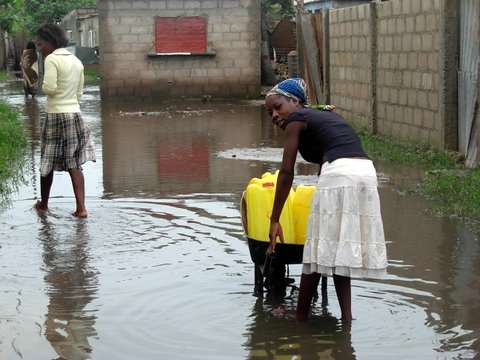
Trash-clogged gutters force rainwater to back up into streets that become a breeding ground for mosquitoes. (Photo by Mercedes Sayagues)
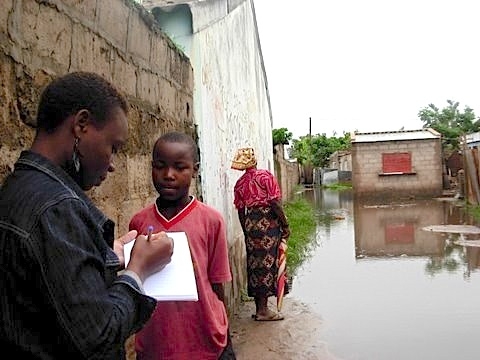
Muchanga (left) interviewed residents from flooded communities about the diseases and poor sanitation that often follow rainstorms. (Photo by Mercedes Sayagues)
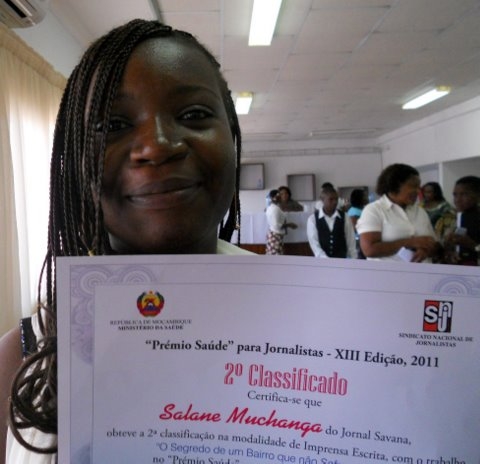
Salane Muchanga’s most recent award honored her health reporting on a community that has prevented flooding—and the ensuing health risks. (Photo by Mercedes Sayagues)
When Knight International Journalism Fellow Mercedes Sayagues arrived at the Savana newsroom in Maputo, Mozambique, in 2010, she found a lone woman reporter covering health and education news, stories that were largely ignored by editors more focused on politics, sports and corruption. “Salane Muchanga was the token woman, and not taken seriously,” recalls Sayagues.
Sayagues went to work, guiding the young reporter in the basics of health journalism. Soon Muchanga was producing gripping and substantive stories on public health problems ranging from filthy water to a dangerous sand-eating fad that was spreading among pregnant women, boys and young men.
Her own editors, other news outlets and the public took notice. In the past year, Muchanga scored three major awards for health reporting – with prize money worth two years’ salary. And along the way, she crafted a new, more respected niche for medical news and for women reporters across Mozambique.
“In the beginning, I wrote an average of one health story a month,” Muchanga said. “Now almost every week my stories relate to health, and they are considered important stories, not secondary. And Savana has a dedicated section just for health news.”
Muchanga’s three awards are:
• First place and US$300 from the Southern Africa Gender and Media Awards sponsored by the NGO (non-governmental organization) GenderLinks, for “Sand That Creates Money And Disease,” a story that exposed the health risks behind a fad many pregnant women and children practice in Mozambique: eating sand. It is sold in markets and on street corners but sometimes contains fecal matter, E. coli and other unsanitary substances (see story here and slideshow here).
• First place and US$2,000 from UN Women for “Grannies Accused of Witchcraft,” a story that described the wrenching, personal plights of elderly women accused of witchcraft, expelled, beaten, even murdered by relatives reluctant to assume the burden of their care. It is a story she managed to report in the heat of the summer sun despite being nine months pregnant at the time (see slideshow here).
• Second place and a prize of US$1,800 from the Mozambique Ministry of Health for “The Neighborhood That Doesn’t Suffer When It Rains,” a feature on one community that has been able to prevent the flooding, backup of raw sewage and spreading of disease that frequently occurs in poor areas.
“I am proud of Salane’s achievements,” said Fernando Lima, head of Mediacoop SA, Mozambique's first independent media organization and the publisher of Savana. “It’s our perception now that health issues are gaining ground in other publications, and Savana’s pioneering effort has led the path for others to cover health topics. Mercedes, Salane and Savana have played a very interesting and fundamental role in changing the media environment here.”
“More print media are covering health regularly, exploring topics other than just the classic trilogy of HIV/AIDS, malaria, and TB, and copying the model of reporting we set at Savana,” Sayagues said. “The government-owned Domingo now regularly has features and center spreads on health, with sidebars, fast facts, descriptions of diseases, causes and treatment. The government-owned Noticias, which has the most widespread distribution nationwide, has started a weekly health page. Scientific Reporter and Verdade, two other publications, have also stepped up their health reporting, so there’s really been an industry-wide shift in Mozambique.”
Muchanga’s awards helped “seal the deal,” she said.